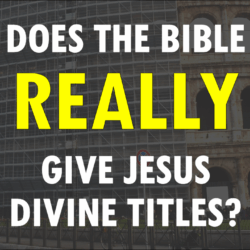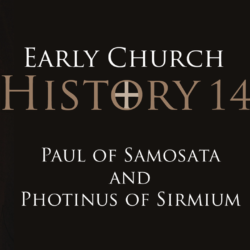This is part 5 of the One God Over All class.
Last time we looked at what Jesus taught about God. Although this class is called “One God Over All,” it’s also important for us to talk about Jesus. If the Father alone is the one God over all, then what does that mean about Jesus? Who is he? We’re going to take the next few sessions to explore what the bible teaches about Jesus. Today our focus is on his primary title–Messiah. In addition we’ll briefly look at John 8.58 and whether or not Jesus claimed to be “The Great I AM.”
Listen to this episode on Spotify or Apple Podcasts
—— Links ——
- More one God resources and posts available here, including “Five Major Problems with the Trinity” and “The Trinity before Nicea“
- If you’d like to support Restitutio, you can donate here or designate Restitutio as your charity of choice for Amazon purchases
- Join our Restitutio Facebook Group and follow us on Twitter @RestitutioSF
- Leave a voice message via SpeakPipe with questions or comments
- Intro music: Good Vibes by MBB Attribution-ShareAlike 3.0 Unported (CC BY-SA 3.0) Free Download / Stream: Music promoted by Audio Library
- Who is Sean Finnegan? Read his bio here.







DEAR Sean,
I believe you are very wrong to declare God as “literally the father”, i.e. male progenitor of Jesus. This echoes Genesis 6 and similar pagan tales of male deities copulating with female humans. Luke considers Adam as the son of God, presumably because he was a “direct” creation of God. Jesus could be seen as second type of direct creation. If you, like Deutoronomy 32:6 and Isaiah 64:8, equate Father with Creator, than of course God is literally the Creator of Jesus in Mary’s womb, albeit in an unusual way, i.e. without the intervention of a male progenitor.
I recently came upon a “Christianity Today” magazine article (Aug. 16, 1993) called “Why God Is Not Mother.”
It says in part that “If Israel asks who God is, the reply is that he is the God of the Exodus. And it is that God of the Exodus whom Jesus also reveals to be his father (Mar 12:29-30).”
The writer, a woman named Elizabeth Achtemeier, added:
“Women suffer discrimination, yes; our world is full of all kinds of evil. But God is holy, the Father Almighty, Creator of heaven and earth….”
Hi Carlos, I don’t this the issue is whether God is a mother or father to Jesus–clearly he is described as being his father–but rather whether he is *literally* so [a father]. Ie did God orchestrate some physical event to create offspring that is in some way directly related to him. I certainly don’t think God is Jesus’s father in this literal sense, if only because I don’t believe God to be physical (but also for other difficult implications it would create).
Another example, God is also described as being a protective bird.
“O Jerusalem, Jerusalem, the one who kills the prophets and stones those who are sent to her! How often I wanted to gather your children together, as a hen gathers her chicks under her wings, but you were not willing!
Matthew 23:37 NKJV
Well ok, but just because God is described as being a bird, doesnt necessary mean he *literally* is one (he is not, of course). So we can reason the same way regarding God being described as being a father. To what degree can this be taken literally is the question, not whether he is either a mother of father.
Regarding your quote, it seems to me that whether women face discrimination is not really relevant when it comes to answering this question.
Mark,
The virgin birth as described by Matthew and Luke (especially) shows a very real, physical event.
That is, how God the Father by the power of the spirit procreated a one-of-a-kind human Son in the womb of Mary.
NOTE words like ginomai, gennao, genesis, monogenes all related to the procreation of other human persons.
Hence, Jesus typically described his coming forth with the Greek preposition EK (“from” or “out of” John 8.42) God the Father.
This of course should not be confused with Gnostic, Nicene and now Muslim influenced ideas of a sexual union producing a demi-god, “very God of very God; begotten, not made” Son of God.
PS: In our upcoming conference Matt Sacra will address some of these issues.
http://thehumanjesus.org/conference/
Hi Sean, great episode, really enjoyed it.
I noticed you addressed 2 Sam 7 about the throne of the son of the kingdom of the son of God/Messiah being established forever. You also explicitly state that this [Messiah] is going to rule forever.
Actually, I’ve been meaning to ask you about this for a while. As you know, at some point the Messiah will deliver the kingdom back to God. So I’ve been wondering, if that is so, how is ‘his’ (the Messiah’s) throne and kingdom established *forever*, how will he actually rule over it forever? Isn’t it ultimately God’s forever? Won’t the Messiah only rule over it until the last enemy (death) has been defeated?
He shall build a house for My name, and I will establish the throne of his kingdom forever. And your house and your kingdom shall be established forever before you. Your throne shall be established forever.” ’ ”
II Samuel 7:13, 16 NKJV
Then comes the end, when He delivers the kingdom to God the Father, when He puts an end to all rule and all authority and power. For He must reign till He has put all enemies under His feet. The last enemy that will be destroyed is death.
I Corinthians 15:24-26 NKJV
And behold, you will conceive in your womb and bring forth a Son, and shall call His name Jesus. He will be great, and will be called the Son of the Highest; and the Lord God will give Him the throne of His father David. And He will reign over the house of Jacob forever, and of His kingdom there will be no end.”
Luke 1:31-33 NKJV
Btw, I’ve never heard this being used as an argument against a unitarian God, but I suppose it could be, so I was hoping for a good explanation. Best I can reason is that indeed the kingdom is forever and this is really what *forever* is really about, not so much about who’s ruling over it. After all even Jesus already called it the kingdom *of God*, not the kingdom of the Messiah, even though it would yet be his to rule over.